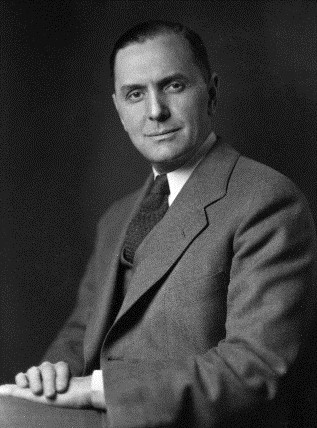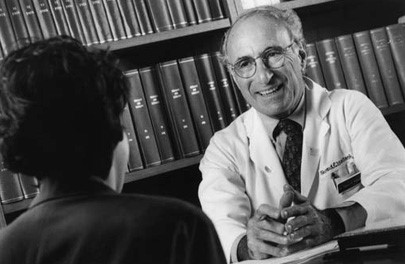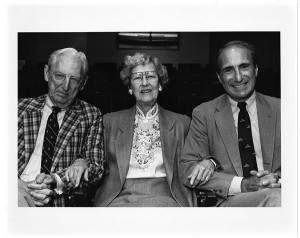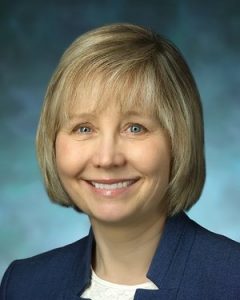 RICHARD W. TELINDE, M.D., the third Professor of Gynecology at Johns Hopkins, was born in 1894 in Waupun, Wisconsin. He attended Hope College and the University of Wisconsin, receiving his AB from the latter in 1917. He started medical school at the University of Wisconsin and transferred to the Johns Hopkins University School of Medicine, where he was elected into Alpha Omega Alpha and received his medical degree in 1920. Dr. TeLinde was an intern in surgery under William Halsted and a resident in gynecology under Thomas Cullen. In 1925, he began a private practice in Baltimore which he maintained until 1972. In 1939, Dr. TeLinde was appointed Chair of the Department of Gynecology, a significant event because Gynecology became a separate department from Surgery. Upon Dr. TeLinde’s retirement as Chair in 1960, Gynecology and Obstetrics became a joint department.
RICHARD W. TELINDE, M.D., the third Professor of Gynecology at Johns Hopkins, was born in 1894 in Waupun, Wisconsin. He attended Hope College and the University of Wisconsin, receiving his AB from the latter in 1917. He started medical school at the University of Wisconsin and transferred to the Johns Hopkins University School of Medicine, where he was elected into Alpha Omega Alpha and received his medical degree in 1920. Dr. TeLinde was an intern in surgery under William Halsted and a resident in gynecology under Thomas Cullen. In 1925, he began a private practice in Baltimore which he maintained until 1972. In 1939, Dr. TeLinde was appointed Chair of the Department of Gynecology, a significant event because Gynecology became a separate department from Surgery. Upon Dr. TeLinde’s retirement as Chair in 1960, Gynecology and Obstetrics became a joint department.
During his tenure, Dr. TeLinde set the tone and created a standard of excellence for an academic department in the specialty of gynecology. He was a superior surgeon and outstanding investigator and teacher. An important part of his legacy was the perpetuation of excellence in gynecology through the training of residents. Eight of his residents became department chairs at academic institutions and three others became directors of gynecology at large community hospitals. Because Dr. TeLinde believed that an understanding of pathology was essential for the training of a gynecologist, he endowed through his personal philanthropy a Chair in Gynecologic Pathology in the Johns Hopkins Department of Gynecology and Obstetrics.
Dr. TeLinde’s research interests were in the areas of reproductive endocrinology, oncology, urinary incontinence, and endometriosis. In 1944, he and his colleagues, Gerald Galvin, MD and Howard Jones, Jr, MD, launched a series of studies spanning 22 years that ultimately provided convincing evidence that invasive cervical cancer was preceded by a noninvasive precursor—carcinoma in situ. Dr. TeLinde strongly advocated and was one of the pioneers of the approach of combining Pap smears and cervical biopsies for the prevention of cervical cancer.
Dr. TeLinde published over 100 research articles making major contributions to the study of granulosa cell tumors of the ovary. His text on surgery, Operative Gynecology, first published in 1946 and still in print today, is often referred to as “the bible” of gynecology, and has been the premier text in the field of gynecologic surgery for more than 60 years. Dr. TeLinde was highly regarded by colleagues nationwide and was a president of the American Gynecological Society. He performed surgery until he was 72 years old and continued with his private practice for 12 more years. He died in 1989 in Baltimore at the age of 95.
 EDWARD E. WALLACH, MD is a graduate of Swarthmore College and received his medical degree at Cornell University Medical College. After an internship in internal medicine at The Cornell Division of Bellevue Hospital, he trained in Obstetrics and Gynecology at Kings County Hospital in New York and completed a fellowship in Reproductive Biology at The Worcester Foundation for Experimental Biology in Massachusetts. Following completion of his residency and fellowship training, he spent two years in the United States Public Health Service (USPHS) as Chief of Obstetrics and Gynecology at the USPHS Indian Hospital on the Navajo Indian reservation in Tuba City, Arizona.
EDWARD E. WALLACH, MD is a graduate of Swarthmore College and received his medical degree at Cornell University Medical College. After an internship in internal medicine at The Cornell Division of Bellevue Hospital, he trained in Obstetrics and Gynecology at Kings County Hospital in New York and completed a fellowship in Reproductive Biology at The Worcester Foundation for Experimental Biology in Massachusetts. Following completion of his residency and fellowship training, he spent two years in the United States Public Health Service (USPHS) as Chief of Obstetrics and Gynecology at the USPHS Indian Hospital on the Navajo Indian reservation in Tuba City, Arizona.
Dr. Wallach spent 19 years on the faculty at The University of Pennsylvania School of Medicine and served as Professor and Director of Obstetrics and Gynecology at Pennsylvania Hospital from 1971 to 1984 before serving as the Director of Gynecology and Obstetrics at Johns Hopkins, a position he held from 1984 to 1994. During this time, the Department received four endowed professorships. Dr. Wallach has been responsible for the specialty training of more than 150 residents, as well as for numerous clinical and research fellows. His commitment to faculty development has led to five of his junior faculty members becoming deans at academic institutions and 14 becoming department chairs, as well as numerous others becoming division directors.
Dr. Wallach and his team were among the first to demonstrate contractility of the ovarian smooth muscle tissue in a pattern that correlated with ovulation. He developed an in-vitro perfused ovary preparation that enabled direct observation of the ovulatory process.

In 1986, he was named chair of the Ethics Committee of the American Fertility Society whose reports have significantly influenced the practice of in-vitro fertilization and set the standard in the field of embryo research and assisted fertilization in the United States. Dr. Wallach is a member of the Institute of Medicine of the National Academy of Sciences, has served as President of the American Fertility Society and the Society for Gynecologic Investigation, and as Director of the American Board of Obstetrics and Gynecology and its Division of Reproductive Endocrinology and Infertility. Dr. Wallach chaired the Medical Board of The Johns Hopkins Hospital from 1991 to 1994. He was appointed the first J. Donald Woodruff Professor in Gynecology and Obstetrics at Johns Hopkins, and in 2014, named a Johns Hopkins University Distinguished Service Professor Emeritus.
